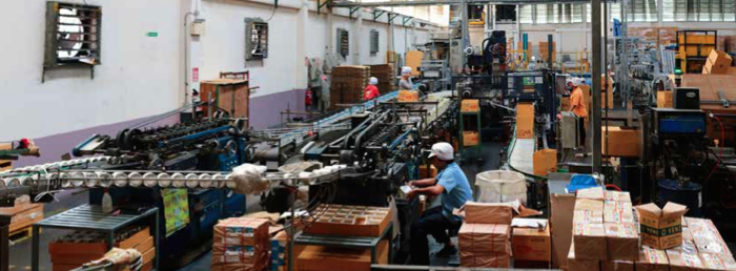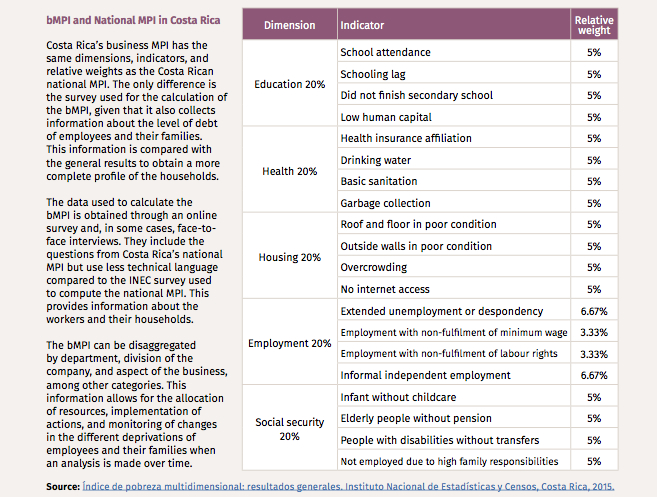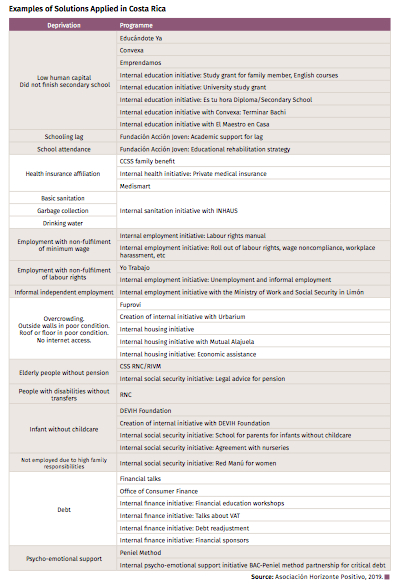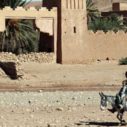
Search
Measuring Poverty in Businesses

In Costa Rica, approximately 87% (1) of jobs are in the private sector. It is a dynamic sector that is constantly growing. However, what are the living conditions of these workers? Does having a job and an income ensure that they have a good quality of life? Could there be multidimensionally poor workers in the private sector? The association Horizonte Positivo, with the support of the Oxford Poverty and Human Development Initiative (OPHI), developed the Business Multidimensional Poverty Index (bMPI) to answer these questions.
Horizonte Positivo worked with the government of Costa Rica in rolling out the national MPI, which identifies who is poor and what their poverty looks like, taking into consideration five dimensions and 19 indicators. However, no one had considered applying the national MPI in other areas until a member of the board of directors of Horizonte Positivo, Ernesto Castegnaro, raised the issue. Castegnaro, who at the time was the general manager of BAC Credomatic Bank for Central America, asked how, as CEO of a successful finance company in the region, he could find out which of his employees were multidimensionally poor.
It was a question that did not have an immediate answer. It is generally thought that salaried employees are, by comparison, in a better situation because they have a job and income. However, their reality could be very different if they experience situations that affect their living conditions. For example, at home they might be caring for an elderly person, a person with disabilities, or a close relative who is still in school, or they may experience problems of a different nature that are not strictly monetary, all of which could go unnoticed if not measured.
The idea was therefore to apply Costa Rica’s MPI to companies, which gave rise to the bMPI. The bMPI is used to describe the situation of workers in greater detail. It thus provides businesses with a reliable and evidence-based tool so that they can face challenges with intelligent solidarity and create initiatives that help to improve the conditions of their employees.
Pioneering bMPI businesses
In 2016, two of the most important businesses in Costa Rica –BAC Credomatic and Purdy Motor (Toyota’s distributor in Costa Rica)– wanted to be pioneers in implementing the bMPI. Both businesses have a positive history of corporate social responsibility and good practices with their employees. Working with these two companies, Horizonte Positivo developed three different components that together formed the basis of the bMPI.
The first component was the methodology. OPHI technicians adapted and simplified the metrics of Costa Rica’s national MPI calculated by the Instituto Nacional de Estadísticas y Censos (INEC), which implied adjusting the questions and creating a technological platform that was user-friendly, allowing for the efficient collection of the information needed to calculate the bMPI.
The second component was the design of protocols to systematise information and transform it into graphics showing general and specific trends. Additionally, the decision was made to incorporate the lev- el of debt of employees and their families –thereby revealing the state of their finances– without altering the calculation of the bMPI, so that it would still be comparable with the national MPI.
An initial financial investment was made, provided by the partners of Horizonte Positivo, to first develop the survey online and then to create a robust platform to analyse the data. This led to a third component that allowed for the detection of the most serious deprivations and where within the company these deprivations were the most common among employees -providing the information necessary to create solutions focused on reducing or eliminating these deprivations.
The bMPI is used to describe the situation of workers in greater detail. It thus provides businesses with a reliable and evidence-based tool.
Once the survey was administered and the main deprivations of workers were defined, BAC and Purdy Motor began to build a series of solutions directed towards workers living in multidimensional poverty, combining these with other existing initiatives. One example is Purdy Cole, an initiative of Purdy Motors in partnership with the Ministry of Education, in which the business helps its workers who have not finished secondary education to complete their studies during working hours. Likewise, BAC developed a financial coaching project to sup- port workers in serious debt. This program, which included the participation of Solidarísta, an organisation of workers focused on generating savings and capitalising on this money, provided a series of services for workers.
Horizonte Positivo has also promoted solutions. One of them is called ‘Emprendamos’ and is aimed at people who are unemployed, in other words, who present a deficiency in the dimension of employment. The association supports those who wish to start their own business by helping them develop an investment plan and communication strategy, as well as providing assistance in acquiring initial capital.
Thus, a model has been built that is being improved constantly, where the technological instruments of surveys, data analysis, and monitoring are optimised so that businesses can find out where to focus their resources and create solutions.
Key factors in implementation
The most fundamental key to the success of the bMPI is the internal communication prior to the launch: both to educate workers about the purpose of the programme (and therefore motivate them to complete the survey) and to explain to them how to fill it out. Horizonte Positivo developed a tool called ‘pre-boleta’, which is a list of information that workers should have in order to respond to the questions related to aspects like the size of their house and the number of people who work in the household, among others. The survey takes between 20 and 30 minutes to be completed.
Communication and awareness-raising among senior management is also important to guarantee that budgets are allocated on time and that executives can make the necessary arrangements for the programme. All parties should be involved.
The bMPI in action
Information is analysed by Horizonte Positivo through the platform. Generally, Horizonte Positivo prepares an executive report that is given exclusively to the CEO and human resources manager (to maintain the privacy of the workers) that contains details of the general results and specific cases that require greater attention. The worker is given an indivualised report before being invited to participate in one of the programmes in education, reprogramming of debts, access to housing, or elderly care.
To date, over 40 business have joined this project and 17,617 workers across the whole of Costa Rica have carried out the survey. If we take their house- holds into consideration, this equates to 59,791 people mapped in the five dimensions of the bMPI.
Future: bMPI seal
Horizonte Positivo has developed a platform that enables the creation of probabilistic scenarios. This allow predictions to be made about how much money needs to be spent when certain solutions are applied for a specific number of people and households in order to reduce the incidence of the different deprivations and thus reduce multidimensional poverty. Horizonte Positivo is also in dialogue with different business chambers and private and public institutions in Costa Rica in order to achieve higher participation in different geographical areas and territorial sub-regions, as well as different industries and branches of economic activity.
In addition, the association is working with sOPHIa Oxford, a non-profit organisation responsible for applying OPHI’s expertise in the private sector, to complete the technical design of a seal that will be awarded to businesses using the bMPI. sOPHIa Oxford is responsible for establishing an audit in order to verify the process of implementing the bMPI, which will analyse if communication was accurate, if data management was ethical, whether the programmes had an impact, and whether deprivations were eliminated, among other things. The seal will be awarded to participating businesses once these requirements have been fulfilled.
For José Aguilar, executive director of Horizonte Positivo, the positioning of this seal in the nation- al imagination is of fundamental importance: ‘The dream, the aspiration, is truly to join it and link it to the national brand of Costa Rica, a country that exports peace and that produces and exports shared prosperity, not just bananas and technology. It exports and produces peace: this is the dream.’
See testimonials at youtu.be/9BqD9Wusfrs
(1) Inec, 2018.
This article was published in Dimensions 8.


















